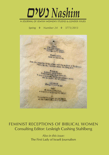
Nashim-A Journal of Jewish Womens Studies & Gender Issues
Scope & Guideline
Amplifying Voices, Shaping Perspectives
Introduction
Aims and Scopes
- Gender and Jewish Identity:
The journal critically examines how Jewish identity intersects with gender, focusing on the lived experiences of Jewish women in various contexts, including religious, cultural, and social frameworks. - Feminist Perspectives on Jewish Texts:
Nashim publishes feminist readings and commentaries on Jewish texts, highlighting the voices and interpretations of women scholars in relation to traditional religious literature. - Historical Contributions of Jewish Women:
The journal emphasizes the historical roles and contributions of Jewish women, documenting their impact on religious, social, and political spheres, thus enriching Jewish women's history. - Cultural Analysis and Artistic Expression:
Nashim showcases cultural analyses and artistic expressions by and about Jewish women, reflecting on literature, visual arts, and performance as mediums for gendered narratives. - Contemporary Issues in Gender and Judaism:
The journal addresses current debates and challenges faced by Jewish women today, including discussions on religious authority, feminist activism, and gender justice within Jewish communities.
Trending and Emerging
- Orthodox Feminism and Gender Justice:
There is a growing body of work that explores the complexities of Orthodox feminism, particularly how it navigates traditional Jewish law (Halakhah) while advocating for gender justice and equality. - Women’s Health and Reproductive Rights:
Recent discussions emphasize women's health issues within the Jewish community, including reproductive rights and the role of female religious authorities in addressing these topics. - Cultural Memory and Representation:
Emerging themes focus on cultural memory, exploring how Jewish women’s narratives are represented in literature and art, particularly in relation to trauma and resilience. - Impact of Jewish Women in Modern Society:
There is an increasing emphasis on the contributions of Jewish women to modern society, particularly in fields such as healthcare, politics, and education, showcasing their roles as leaders and innovators. - Sexual Abuse and Power Dynamics:
Recent articles critically analyze the intersection of gender, power, and abuse within Jewish communities, highlighting the need for accountability and reform in addressing these sensitive issues.
Declining or Waning
- Traditional Gender Roles in Jewish Communities:
Discussions focused on traditional gender roles and their implications have become less frequent, possibly reflecting a shift towards exploring more progressive and egalitarian perspectives. - Historical Narratives of Jewish Men:
There appears to be a waning interest in narratives centered exclusively on Jewish men's experiences, as the journal increasingly prioritizes women's voices and contributions in its scholarly discourse. - Interfaith Gender Studies:
Themes exploring interfaith dynamics specifically through the lens of gender have seen a decrease, potentially due to a more concentrated focus on intra-Jewish gender issues.
Similar Journals

Quest-Issues in Contemporary Jewish History
Navigating the Complexities of Jewish History TodayQuest - Issues in Contemporary Jewish History is a pivotal open-access journal published by the Fondazione Centro Documentazione Ebraica Contemporanea in Italy. Since its inception in 2010, this journal has been dedicated to the scholarly exploration of the multifaceted dimensions of contemporary Jewish history, making significant contributions to the fields of history and cultural studies. With an ISSN of 2037-741X, it serves as a vital platform for researchers, professionals, and students alike, providing access to an array of insightful articles and research findings. As of 2023, it holds a respectable Q3 ranking in the History category within Scopus, indicating its growing influence in academia, alongside a rank of #899 out of 1760 in Arts and Humanities – History. This makes it an essential resource for those looking to deepen their understanding of Jewish history in a contemporary context. The journal, with its rich scholarly outputs converging from 2017 to 2023, is based in Milan and strives to foster high-quality research in Jewish studies.
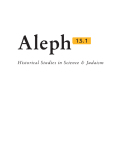
Aleph-Historical Studies in Science & Judaism
Connecting Historical Insights with Contemporary DiscoursesAleph-Historical Studies in Science & Judaism, published by Indiana University Press, is a pivotal journal at the intersection of history, religious studies, and the philosophy of science. With an ISSN of 1565-1525 and an E-ISSN of 1565-5423, this journal has gained recognition for its insightful exploration of the complex relationships between scientific practice and Jewish thought from 2009 to 2023. Operating from the heart of the United States, Aleph currently holds a Q4 category ranking in History, History and Philosophy of Science, and Religious Studies, reflecting a growing interest in its unique contributions to these fields. Notably, it ranks within the 79th percentile in Arts and Humanities History and Religious Studies, underscoring its significance in advancing scholarly dialogue. Although currently not an Open Access journal, it remains an essential resource for researchers, professionals, and students dedicated to uncovering the narratives that shape our understanding of science and religion.

Jewish Studies Quarterly
Deepening Understanding of Jewish Cultures and PracticesJewish Studies Quarterly, published by MOHR SIEBECK, is a leading academic journal dedicated to advancing scholarship in the field of Jewish studies. With its ISSN 0944-5706 and E-ISSN 1868-6788, this journal provides a platform for rigorous research that explores various dimensions of Jewish history, culture, religious practices, and contemporary issues. Although it does not currently offer open access options, it remains an essential resource for researchers, professionals, and students seeking insightful analysis and academic discourse. The journal is widely recognized for its commitment to excellence and contribution to understanding Jewish identities within global contexts. Located in Tübingen, Germany, Jewish Studies Quarterly is integral to the dialogue and scholarship surrounding Jewish thought and heritage, making it a vital reference point in the academic community.
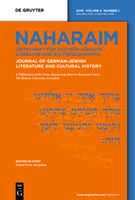
Naharaim
Cultivating Knowledge in the Heart of the Near EastNaharaim is a distinguished academic journal dedicated to fostering interdisciplinary scholarship in the field of Near Eastern studies. Published by Walter de Gruyter GmbH, this journal aims to provide a platform for innovative research that explores the rich historical, cultural, and social dynamics of the region. With an ISSN of 1862-9148 and an E-ISSN of 1862-9156, Naharaim adheres to high academic standards, although it does not currently offer open access options. The journal aspires to engage a global audience of researchers, professionals, and students eager to contribute to and gain insights from the evolving discourse surrounding Near Eastern cultures and histories. Through rigorous peer-reviewed articles, Naharaim plays a vital role in advancing knowledge and understanding in a field of study that is increasingly relevant in today’s interconnected world.
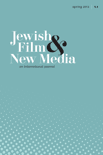
Jewish Film & New Media-An International Journal
Unveiling New Perspectives in Jewish Film and MediaJewish Film & New Media: An International Journal, published by Wayne State University Press, serves as a crucial platform for scholars and practitioners within the realms of Film Studies, Jewish Studies, and Media Studies. Since its inception, the journal has explored the intersection between Jewish culture and cinematic representation while also addressing contemporary media narratives. With an ISSN of 2169-0324 and E-ISSN 2169-0332, it is indexed in major databases, showcasing solid rankings in various disciplines, including a commendable Q2 rank in Visual Arts and Performing Arts. Despite its current Q4 categorizations in Anthropology and Communication, the journal is noted for its engaging contributions that sow rich discussions about Jewish identity, filmic expression, and media representation. Researchers and students alike benefit from the journal’s wealth of interdisciplinary scholarship, which spans converged years from 2013 to 2017 and 2019 to 2022, ensuring a robust timeline of critical inquiry. As an essential resource for understanding the nuances of Jewish film and new media, this journal occupies a unique niche, inviting contributions that push the boundaries of current academic dialogue.
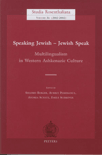
STUDIA ROSENTHALIANA
Bridging Past and Present in Jewish Cultural StudiesSTUDIA ROSENTHALIANA is a distinguished journal published by Amsterdam University Press, specializing in the interdisciplinary study of Jewish culture and history, particularly as it relates to the field of Rosenthaliana, encompassing literature, art, and historical scholarship. With a robust academic legacy dating back to its inception in 1970, the journal has evolved through various publication phases, maintaining a commitment to fostering scholarly discourse and disseminating significant research. Although it does not currently participate in an open access model, STUDIA ROSENTHALIANA continues to contribute invaluable insights to the fields of Jewish studies, cultural analysis, and historical research. Researchers, professionals, and students can benefit from its comprehensive essays, critical reviews, and analytical studies that enrich our understanding of Jewish heritage and modern implications. The journal's influence and relevance in its field make it an essential resource for anyone invested in contemporary debates and analyses concerning Jewish culture and identity.
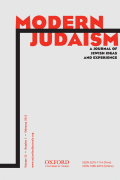
MODERN JUDAISM
Fostering Scholarly Dialogue on Contemporary JudaismMODERN JUDAISM is a premier journal dedicated to the multifaceted exploration of Jewish culture, history, and religious practice, providing a significant platform for scholarly discourse since its inception in 1981. Published by Oxford University Press Inc in the United States, this journal stands out with its diverse engagement across disciplines, reflected in its commendable 2023 category quartiles: Q2 in Cultural Studies and History, Q1 in Religious Studies, and notable rankings in Political Science and Sociology. With an impact factor that underscores its rigorous peer-review process and scholarly relevance, MODERN JUDAISM serves as an essential resource for researchers, professionals, and students alike, fostering an academic environment conducive to innovative ideas and comprehensive studies. Although not open access, the journal remains crucial for anyone looking to deepen their understanding of contemporary Jewish thought and its intersection with broader cultural and political currents. For further inquiry or submissions, please refer to the Journals Department at 2001 Evans Rd, Cary, NC 27513.
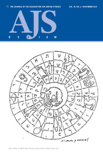
AJS Review-The Journal of the Association for Jewish Studies
Engaging with Critical Issues in Jewish StudiesAJS Review - The Journal of the Association for Jewish Studies is a leading academic journal published by the University of Pennsylvania Press, dedicated to advancing scholarship in Jewish studies. With its ISSN 0364-0094 and E-ISSN 1475-4541, the journal offers a rich compendium of research from various disciplines, including cultural studies, history, literature and literary theory, and religious studies. Recognized within the Q2 and Q3 quartiles across multiple categories in 2023, AJS Review provides an esteemed platform for academics to disseminate innovative ideas and engage with critical issues relevant to Jewish history and culture from 1976 to 2024. Although not an open-access journal, it ensures that high-quality, peer-reviewed articles are available to a global audience, enabling researchers, professionals, and students to foster deeper insights into Jewish narratives and heritage. By promoting interdisciplinary dialogue, AJS Review is integral to the academic community, offering valuable contributions to our understanding of Jewish studies and its broader implications.

European Journal of Jewish Studies
Unveiling New Perspectives on Jewish Heritage and ScholarshipEuropean Journal of Jewish Studies is a distinguished academic publication that offers a comprehensive platform for scholarly inquiry into Jewish studies, addressing critical intersections with cultural studies, history, literature, and religious studies. Published by BRILL, a leading academic publisher based in the Netherlands, this journal boasts a robust reputation supported by its impressive rankings and quartile classifications—Q3 in Cultural Studies, Q3 in History, Q2 in Literature and Literary Theory, and Q3 in Religious Studies as of 2023. With its convergence years spanning from 2007 to 2024, the journal serves as a vital repository of research that navigates the complexities of Jewish identity and culture through interdisciplinary lenses. Although it does not operate under an open access model, the journal's rigorous peer-review process ensures the publication of high-quality research essential for students, professionals, and academics alike. Engaging with this journal opens up pathways for critical dialogue and innovative contributions to the field, making it an essential resource for those invested in the rich tapestry of Jewish studies.

JOURNAL OF JEWISH THOUGHT & PHILOSOPHY
Exploring the Depths of Jewish Intellectual TraditionsThe JOURNAL OF JEWISH THOUGHT & PHILOSOPHY, published by BRILL, stands as a significant academic resource since its inception in 1993. With the ISSN 1053-699X, this interdisciplinary journal uniquely bridges various fields including Literature and Literary Theory, Philosophy, and Religious Studies, providing a platform for rigorous exploration of Jewish intellectual traditions and their broader cultural implications. Holding esteemed rankings across multiple categories, including Q1 in Literature and Literary Theory and Q2 in Philosophy, the journal appeals to researchers and scholars worldwide. The journal is not open access but is available through numerous academic libraries, making it accessible to those dedicated to advancing knowledge in Jewish thought. By fostering critical discourse and innovative scholarship, it remains an essential resource for understanding complex intersections of faith, ethics, and society from a Jewish perspective.